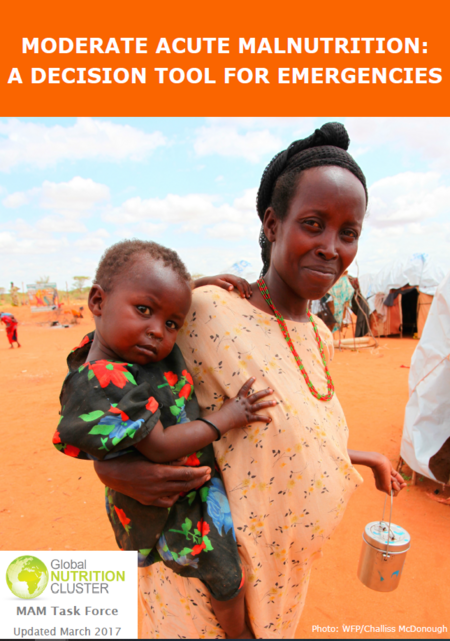Request support on coordination, information management, integration for nutrition outcomes or technical nutrition in emergencies assistance.
التماس الدعم لتنسيق التغذية وإدارة المعلومات والتغذية في حالات الطوارئ
Demander un appui pour la coordination de la nutrition, la gestion de l'information et la nutrition dans les situations d'urgence
Buscar apoyo para la coordinación de la nutrición, la gestión de la información y la nutrición en situaciones de emergencia
Solicite apoio para coordenação em nutrição, gestão de informação e nutrição em emergências

Decision Tool for MAM in Emergencies, 2014 (updated 2017)
The Decision Tool for Management of Moderate Acute Malnutrition (MAM) in Emergencies has been finalised by the GNC MAM Task Force in 2014. Update: June 2017: We are pleased to announce that the interim operational guidance for CMAM programming in exceptional circumstances has been finalized. The guidance is posted on our website as an appendix to the Decision Tool for MAM in Emergencies (GNC MAM task force, June 2014; appendix D) The interim operational guidance in its current form was developed by UNICEF and WFP in collaboration with the GNC’s former MAM task force members, additional agencies and technical experts (all acknowledged in the document) - to address shortfalls in the continuum of care for acute malnutrition in emergencies. The interim operational CMAM guidance suggests revised protocols for Community Based Management of Acute Malnutrition (CMAM) in exceptional circumstances to support life-saving measures in acute crisis situations in the absence of either an Outpatient Therapeutic Program, a Targeted Supplementary Feeding Program or both. The revised protocols deviate from the standard CMAM protocols in terms of using RUSF to treat SAM and RUTF to treat MAM when there are no other alternatives available. Ultimately, the guidance is intended to provide options for agencies operating in emergencies when the risk of inaction is greater than the risk of action in terms of avoidable mortality risk. It is not intended to replace the standard CMAM protocols that have informed national protocols and are based on the global knowledge and research defining best practices to date. The need to apply the interim operational guidance should be identified and agreed through the Country Nutrition Cluster (or other active coordination mechanism). Use of a revised protocol must meet the requirements defining an exceptional circumstance, including use on a temporary basis with a plan in place to transition back to the national/standard protocols. As part of the learning agenda, country cluster coordinators will monitor the implementation of the interim operational guidance with support of the GNC, UNICEF and WFP, to contribute to global operational evidence on the use of the interim guidance. UNICEF and WFP headquarters agree to keep overall track of where amended protocols are being implemented, in collaboration with the Global Nutrition Cluster Coordination Team, Helpdesk and GNC partners. To download the Decision Tool with the new Interim Operational Guidance (Annex D), please click the following link: [download id=„6606"] http://nutritioncluster.net/resources/ma/ For any queries, please contact the GNC Coordination Team.
